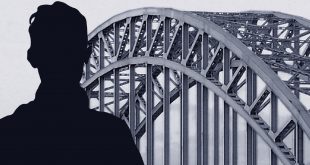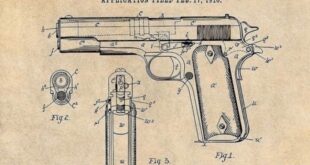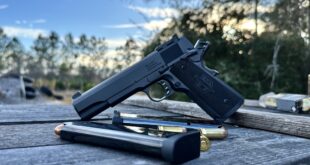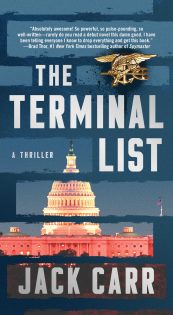
Interview with former Navy SEAL Sniper and author, Jack Carr
- Tell us a little about your background.
From 1996 to 2016, I was in the military. From a very early age I knew I wanted to serve my country in uniform and had my sights on becoming a SEAL. My grandfather was a Marine Corsair pilot killed in WW II, so I grew up surrounded by old black and white photos of him with his plane, the silk maps they issued aviators back then, his wings, medals, and the flag they gave my grandmother when he didn’t come home. I grew up with the idea of him as a hero and knew I would one day follow in his footsteps and join the military. I felt it was my duty, but it was also a calling. I enlisted because I wanted to be a sniper. I also wanted to learn the trade, establish a reputation, and build a foundation in the tactical skills required to excel in special operations before deciding if I was going to become an officer. Back then one had to first go to Boot Camp to screen for BUD/S, then continue on to “A” school which is like an MOS school and used to be required before going to BUD/S because the Navy figured that most candidates were going to wash out fairly quickly and then go to the fleet. Then it was BUD/S and on to my first SEAL Team. We went to Army jump school back then, so I went to Fort Benning for static line immediately after I checked in. My first platoon was a pre-Sept 11th deployment after which I went to sniper school and the Army freefall school in Yuma, Arizona. A couple weeks into my second deployment was Sept 11th2001. My timing was good in that I was able to do the things I came into the SEAL Teams to do, deploying to the Northern Arabian Gulf, Afghanistan, Iraq, and the Philippines. Along the way I became an officer and retired after twenty years of service. It was a good run, but after my last deployment, it was time to pass the torch to the next generation of Frogmen and take care of my family.
- When did you know you wanted to be a writer?
My mom was a librarian, so I grew up surrounded by books. Back in the 80s there was not much written about SEALs or special operations in general, so a lot of my information came from fictional novels with characters who had backgrounds I wanted to have in real life when I got older. I always knew that one day I’d join the ranks of the authors I loved reading during those formative years, but the military had to come first. One of my few non-fiction sources was Soldier of Fortune magazine, so it’s quite surreal and a serious honor to be doing this interview with you today. My mom was not a fan, but my dad would sneak me a copy he’d pick up at the newsstand on his way home from work, and I spent many a night immersed in war stories from Vietnam, Central America, and Africa. I read everything I could about Robert K. Brown and have now met him a few times in my post military life. What a story! I even managed to go to two Soldier of Fortune conventions in Las Vegas when those were still going on.
- What is The Terminal Listabout?
At its base level, it’s a story of revenge without constraint. Novels and movies about revenge always resonated with me, so that’s where I wanted to start my writing journey and the journey of my protagonist, James Reece. Reece is a Navy SEAL sniper turned SEAL officer who is on his last deployment when disaster strikes in the mountains of Afghanistan and then again on the home front upon his return. He begins unraveling a conspiracy involving the testing of drugs on our nation’s most elite warriors and compiles a list of those involved and responsible for the deaths of his troop and family. He then prepares for his mission and starts killing those involved using the tactics and techniques used by the enemy in Iraq and Afghanistan, so at another level it’s about someone abandoning the rule of law and becoming the terrorist and insurgent he’d been fighting for sixteen years of constant warfare. One step further, it’s about a veteran of the War on Terror bringing that war home to the people who have been sending young men and women to their deaths downrange from comfortable offices in Northern Virginia and D.C. for closing in on two decades.

- How has your background as a SEAL sniper informed your writing?
Something you won’t find in my books is a safety on a Glock or anyone inserting a “clip” into a fully automatic revolver. The weapons and tactics have to be spot on. Another aspect is one I didn’t fully appreciate or even expect when I started writing and that’s how I tapped into the feelings associated with real-world experiences in combat and then applied those emotions to a fictional narrative. It actually ended up being a very therapeutic process. Sharing those emotions really added to the authentic feel of a story that is at heart a political thriller. As a SEAL, I aggressively solved problems on the battlefield. As an author, I solve those problems on the page, in much the same way I once did downrange, though now the stakes are a bit different.
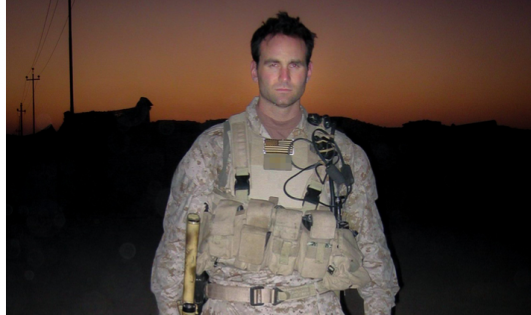
- In a genre full of special operations protagonists, what sets James Reece apart?
I wanted him to be likeable. I wanted him to be someone you’d want to grab a beer with but who could then flip a switch and apply his training, drive, focus, skillset, and combat experience to a problem set. I like to call it “thoughtful violence.” His background is very similar to mine except that he is much more skilled, stronger, faster, smarter, and wittier than I could ever be. I also didn’t want him to be a super hero and be good at everything which I think makes him relatable. He is very good with the gun, but he struggles in other areas he isn’t as familiar with, like surveillance. He likes to spruce up his coffee with honey and cream and makes mistakes like we all do. I also sprinkle in leadership and tactical lessons from the modern battlefield along with some other hidden gems for those have spent time downrange. James Reece is on a transformative journey, which is something we can all relate to.
- Why do you think The Terminal Listhas been such a resounding success?
In no small measure, it is due to the word of mouth recommendations of readers. I was completely unknown with the launch of The Terminal Listlast year. I had no social media presence and didn’t have a background in politics, sports, or business. Simon & Schuster, Atria Books and Emily Bestler Books took a risk on me as a complete unknown. I owe it to them, and my family, to do everything I can to put forth the best product possible, exceeding expectations at every turn. I love every part of the writing process and feel so fortunate to be doing something I am so passionate about. I also enjoy being able to thank readers who reach out via social media or come to book signings, as they are the reason this venture has been such a success. I’ll never forget that.
- How did you prepare for your career as a writer?
I’ve been in training for this my entire life even though I didn’t consciously recognize it at the time. By knowing that I wanted to both serve my country as a SEAL and then write fiction I wasn’t distracted, nor did I waver, from following those paths. At the time I looked at these two different professions as separate and distinct but now I see them as complementary. Growing up, I was constantly reading and knew that I would one day write in the genre I loved. My professors in those formative years were authors like David Morrell, Nelson DeMille, Tom Clancy, Mark Olden, A.J. Quinnell, J.C. Pollock, and Louis L’Amour. Later I discovered the legendary Stephen Hunter and devoured everything he’d ever written. While in the Teams I’d escape into the pages of novels by the late great Vince Flynn, Daniel Silva, Brad Thor, and more recently, Mark Greaney. I didn’t practice writing or think about storylines while I was in the SEAL Teams until I returned from my last deployment and made the decision to get out. As a leader you owe those you are taking into combat your sole focus. That is what you owe them, their families, the Team, the mission, and the country. Everything, including family, took a back seat to doing everything I possibly could to enable me to make the best decisions possible under fire. My academic study of the enemy, tactics, lessons learned, terrorism and insurgencies, along with time in combat, now informs my novels.
- I noticed the government redacted certain portions of The Terminal List. Can you tell us about that?
I wanted to ensure I was honoring my former security clearances so, even though it was fiction, I submitted it to the Department of Defense Office of Pre-Publication and Security Review. To my surprise, they redacted a few sentences which I left blacked out in the novel. I didn’t know if I’d be required to re-submit if I rewrote those sentences and I didn’t want to wait on the DoD to review it again. Looking at it now, I think it added a level of authenticity to the story.
- Do you know how difficult it is to get a book published by a major publishing house?
I get asked this question quite frequently and my answer is always the same; I have no idea. It is very similar to how I approached BUD/S. I’d read it was some of the toughest training devised by a modern military which was part of the draw. I’d read that there was an 80% attrition rate. I was looking for that crucible, that test. Instead of worrying about the odds of making it through I focused on training and preparing. Much like SEAL training, I didn’t spend time thinking about how difficult it is to get published. I looked at that as wasted bandwidth that could be spent writing. All I knew is that I was going to write the best novel I could and then send it to New York. I didn’t know that usually people have agents who shop their client’s work to different publishing houses. I just knew I wanted to send it to Emily Bestler, the same editor and publisher as Vince Flynn and Brad Thor. I also got incredibly lucky along the way and through an interesting set of events, Brad Thor opened the door for me, and the book ended up on Emily Bestler’s desk. One of the mantras I live by is, “never pay attention to the odds.” Han Solo said something similar in The Empire Strikes Backbefore flying into an asteroid field; the influence of popular culture was strong in the 80s. I never want to waste time worrying about the odds. That time is better spent doing.
- Is there any movie news we can announce? This story seems primed for the big screen.
There is news on that front, but it’s still classified.
- Your website is amazing, with a lot of information on the gear and weapons you used in the military and in your books. Is that something you will continue to update for those readers who want more technical information on guns and gear?
Absolutely! In the novels you can only go so deep to keep the story moving forward. I get a lot of questions about the gear and weapons from the books, so the website allows the more gear-centric readers to deep dive into some of what I used in the SEAL Teams and other gear that I use today in my post-military life.
- Do you regularly shoot, workout, and keep your skills sharp?
I try to shoot as often as I can, but it is not nearly as much as I did in the Teams. I get out to see Clint Smith at Thunder Ranch in Oregon at least once a year for a tune up and try to get on the range with my friends who also happen to be some of the best combat shooters in the world; guys like Larry Vickers, Ken Hackathorn, Dom Raso, and Pat McNamara. I’ve gotten to know Kyle Lamb over the past year and look forward to shooting with him soon. I get out to FTW Ranch in Texas about once a year to stay sharp on my long-distance shooting. It’s always humbling to train with all these guys. On the workout front I have a group of complete animals I train with in the mornings up in the mountains where we live. They also keep me humble with serious Crossfit style workouts combined with trail running.
- What advice would you give to people leaving military service?
Everyone takes a different path and one way is not necessarily going to work for everyone. For me, it was important to make a clean break and to identity what was important to me beforeI left the military. It can be tough to leave the close knit world of special operations, a profession where you are focused on something greater than yourself, part of an elite team with a common goal, where the consequences of not being 100% dedicated and focused on your craft can mean mission failure and the deaths of your teammates who also happen to be your best friends. That’s hard, if not impossible, to replicate on the outside. I recognized the military as one chapter in my life. I am now an author. My past experience certainly informs my writing and will always be a part of me, but the important word there is “part.” It’s helped make me who I am today and with the benefit of hindsight, reflection and introspection, the experience of combat has hopefully made me a better father, husband, citizen, and writer. I think it is of vital importance to find your next mission in life, your purpose. I was fortunate in that I clearly identified what was important to me before leaving the military – freedom. My next mission in life is taking care of my family and being the best writer I can be, continually learning, adapting and improving along the way.
- Do you think you will ever write a non-fiction book about your time in the SEAL Teams?
There are a lot of non-fiction books out there by people who did much more than I ever did. “Never say never,” but for now I’ll stick to fiction.
- Where can people find and interact with you?
I am active on Instagram and Twitter at @jackcarrusa. I have a Facebook account at @jackcarrusa where things are re-posted, but three platforms was a bit much so my focus is on Instagram and Twitter. I try to respond to each and every message as I am sincerely thankful to everyone who reaches out. You can sign up for my newsletter on my website, officialjackcarr.com, to stay up to date with what I’m reading, what gear and guns I’m using, and what’s next in my writing journey.
- What’s next for Jack Carr and James Reece?
My second novel, True Believer, hits shelves on July 30th. Its publication was delayed from the original April release date because of a more robust review by the government which took almost seven months, six more than they advertised at the time of submission. I’m finishing up the rough draft of book three this summer and will start in on book four this Fall. The questions plaguing James Reece on his journey are similar to those facing men and women leaving the military. After the traumatic events of the first novel, can he learn to live again? Can he find purpose and meaning as he moves forward, or will ghosts from the past drag him into the darkness? Stay tuned to find out!
– Jack Carr is a former Navy SEAL sniper and author of The Terminal Listand True Believer. He lives with his wife and three children in Park City, Utah where he is hard at work on his next novel. Follow along on Facebook, Instagram and Twitter at @jackcarrusa and visit his website at official jackcarr.com
Ramadi, Iraq 2005 / 2006
The Battle for the City of the Dead – the Battle for Najaf. August 2004
Ramadi, Iraq 2005
BUD/S 1997
Afghanistan 2003
Afghanistan 2003
Baghdad 2006
Baghdad, Iraq 2006
Ramadi 2005 / 2006
Ramadi 2005 / 2006
 Soldier of Fortune Magazine The Journal of Professional Adventurers
Soldier of Fortune Magazine The Journal of Professional Adventurers


